The War that Had to Be Won (1936: The Road to War)
- Thread starter Kurt_Steiner
- Start date
-
We have updated our Community Code of Conduct. Please read through the new rules for the forum that are an integral part of Paradox Interactive’s User Agreement.
You are using an out of date browser. It may not display this or other websites correctly.
You should upgrade or use an alternative browser.
You should upgrade or use an alternative browser.
Hi, just read through this and it's amazing! My two bits though, what about attacking Warsaw from the rear through Lublin?
Actually, the French Army was pretty awesome in WW1. Interwar and WW2 it was a problem of leadership and doctrine. Once the war reached France proper, the average French soldier fought very, very hard.
I don't deny that the troops were as courageous as others. It's just that the military as an organization is laughable.
Chapter forty-five: Before the storm
Major Alexei Kaminin was quite hangered by the endless flow of orders from the top. To go to the front, to pull back, to stay where he was, to move to the right, to move to the left, not to move... In the last few days his decimated batallion (a reserve unit) had been moving without a pause since his unlucky bautism of fire. And now, after five days of marching back and forth, once Kaminin had managed to find a quite village to rest his unit, he was ordered to go to another place. And worse still, it has a NKVD major who was ordering him to do so.
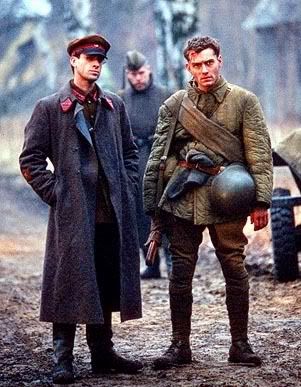
Major Alexei Kaminin seen here with one of his soldiers
Kaminin protested strongly, of course. The bulk of his three companies were already in the village and the rest was in Warsaw. In addition to this he was waiting for the arrival of more reinforcements, around one thousand raw recruits. But the NKVD officer did not care. "I don't mind" -he told Kaminin with a hard look on his eyes- "You have to go now". Kaminin attempted to resist a bit. Even for all his ambitions and strongheaded temper, the 37 year old officer was not the one to have the slightest wish to cross his path with the NKVD and he knew that, by then, he had tempted enough his fate. But the order still upseted him. So, he moved away his soldiers to the nearest city of Lodz. The new rest area that Kaminin selected was a crossroad that commanded the routes to the city
Major general Nikolai Batiuk had lost his faith in Stalin after the big purges and the Yezhovshchina that followed them. As he worte in his diary, which remained unpublished until the end of the war "I've never been a robot and I don't want to turn into one of them". After the trials and the executions that that decimated the top ranks of the Red Army he reflected upon the pages of his diary that "we are living through the blackest days of the Motherland". Finally, during the first days of the war, as the Panzers rolled over Poland, his criticism was heard too loud and the NKVD fixed his attention on him. Only the unstable war situation prevented them from arresting Baituk, even if Beria was very keen of having him back to Moscow to have a "small chitchat about the course of the war". Only the intervention of Baituk's commander, General Zukhov, who was determined to keep his best specialist in tank warfare with him and used all the tricks in the book -even adressing himself to Stalin- allowed that Baituk's visit to Moscow was postponed, at least, for a while.
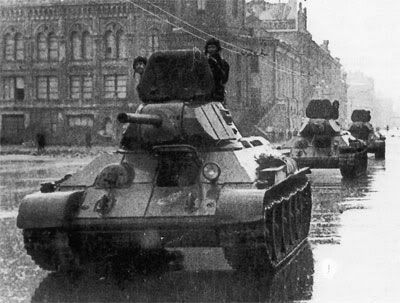
Soviet tanks on the empty roads of Warsaw.
The angered Baituk began to work then on the reorganization of his decimated command. His two amoured divisions had been reduced by the hard fighting to just two undersized brigades. The 9th Armored Division, commanded by Generalmajor Alexandr Glichov, and the 10th, under lieutenant colonel Alexei Kondrashov, were to remain for a time in the outskirts of Lodz prior to be withdraw to Warsaw, where they would be reinforced and reorganized. Until that moment, the 9th Division only had 6,000 men and 20 T-34s tanks, instead of the usual 10,000 men and 180 tanks. The 10th Division was in worse shape, gathering just 3,500 mean and just a few tanks. However, both formations were handsomely equipped with self-propelled guns, armored vehicles, field artillery and mortars. The first reinforcements were to arrive directly to Lodz, but the rest waited for the division in the Polish capital, to where Baituk's corps was to depart in three days.
@Sumeragi: I think that the problem with the French army in 1940 was related with their commanders. Once the French soldiers had good officers, good tactics and good weapons they were excellent soldiers. But, of course, meanwhile they were the laughing stock of the world along Musso's army.
@SovietAmerika: We're working to fix that :laugh:
@J.J.Jameson: As the game was ended some months ago, your suggestion is a bit late, but I tried something like that. More or less, you know...
@trekaddict. The problem was that Gamelin et al wanted to fight WW2 in WW1 style. And that, you know, doesn't work too well
@Sumeragi -2- Neither do I. The troops were fine -even the average Italian soldier did fight with courage, what the heck-. The problem was elsewhere.
Last edited:
@Nathan Madien: A new meaniong for "Warsaw"? I'm lost, sorry.
Yes, Warsaw is going to be an interesting battle... but Free Poland is going to need a new capital and I don't think that they would like the idea of seeing a lunar landscape and say "you know, that was Warsaw."
Thus, the new meaning of "Warsaw".
By the way, did they have robots back then?
Thus, the new meaning of "Warsaw".
By the way, did they have robots back then?
IIRC a czeck invented the term OTL in the 1920 or so, so they do have robots in a way....
Also, a good officer whose hands are tied by some political nutckase, yeah, that'll work well for the soviets
'Rosum's Universal Robots' written by this guy: http://en.wikipedia.org/wiki/Karel_ČapekIIRC a czeck invented the term OTL in the 1920 or so, so they do have robots in a way....
Also, a good officer whose hands are tied by some political nutckase, yeah, that'll work well for the soviets
Chapter forty-six: Breaking the front
Perched on the top of a church, General Wilhelm Ritter von Leeb was looking to the waves of bombers that crossed over his head. It was a vision that calmed him but "I didn't thought that the battle was going to be an easy one", von Leeb remembered later. He had attempted to be prepared to solve any possible trouble that may appear. For that reason he had ordered to his men to gather as much food, gas, and ammunition as they could carry with them "as it was quite possible that we would have to depend in our own resources". Then, he gave the order to attack. It was 14.15 pm, January 13rd, 1940. Some 250 fuiled guns opened fire at that precise minute.
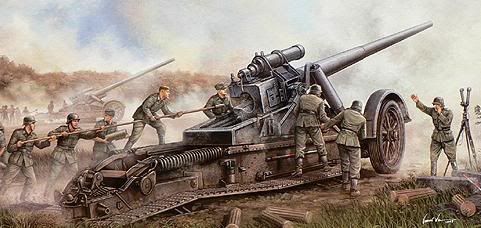
The barrage was terrible and it devastated the enemy position. The hurricane of fire fell in a front which was 1,500 metres long and 7,000 deep. Even before the tanks of the 2. Garde-Panzer-Division began to move the ground was already shaking. Behind the forward units, hundreds of tanks, armored vehicles and trucks began to move, ready to advance once the front was broken. A schwarm of Stukas overflew the battlefield waiting for the command of the Imperial Guards, Oberstleutnant Theodor von Kretschmar-Schuldorff, to attack any enemy position that dared to come to life. At 14.35 pm, Oberleutnant Anton von Kalteneck, seating on the top of the turret of his tank, shouted "Forward!".
Slowly the armored column came to life and began to advance through the road at a speed of 12 kmh. At bombardment then moved to run in front of them at the same speed. The shells flew over the tanks and exploded just in front of them, covering the area with dust. Such was the chaos that the panzermen wondered if their own fire was more dangerous than the enemy that was being silenced.
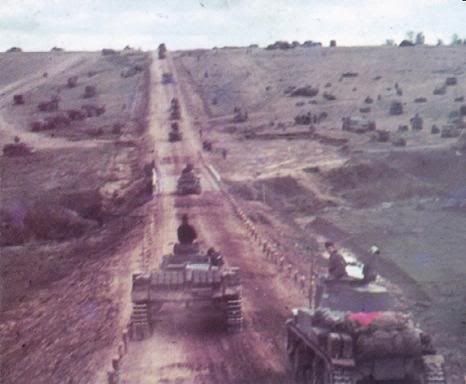
Behind the first tanks was von Kretschmar-Schuldorff in his command tank. From that position he could see the movement of the column, the panzergrenadiers who travelled with the tanks and the yellow ribons of the panzers used to be identified by the Stukas. "The noise was terrible -remembered von Kretschmar-Schuldorff-, but everything was going as planned". Hauptman Lanner, CO of the Third Armored Squadron, radioed "We've moving without troubles. The advanced squadron has crossed the line". Then, in a few seconds, everything changed. As oberleutnant von Kalteneck remembered "the Reds began to hit us very hard".
Placed in well camouflaged trenches, the Polish gunners had not only survived the ordeal of fire, but also waited for it to move on and waited. They allowed the first tanks to move on and then fired. Then, in just two minutes, three tanks of the first squadron and six from thom the next one were destroyed.
Obergrefeiter Johannes Strauß was wounded then."I don't remember to have herd the explosion -he said- but I found myself on the ground, lying with a stupid face and with my tank burning not too far away. One of my mates had lost an arm and another one was dead. I didn't see any other crewmen going out of the tank".
The advance had been stopped before it even began and nine blocked the road. To break the stalemate von Kretschmar-Schuldorff ordered the Stukas to attack. Guided by red smoke shells fired by the mortars of the Imperial Guards, the Junkers Ju 87 dived over the Communist batteries. "It was the first time that I saw them in action -the officer told later- and it was a marvellous sight. The came one by one as if in a parade. They just released they bombs with total precision. Then HQ asked how the battle was going. My second in command raised the micro and told them Listen".
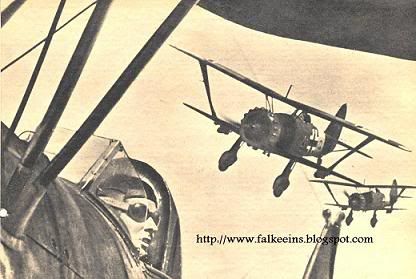
While the Stukas and a few Henschel Hs 123 hammered their trargets, the panzers moved out of the road and began to advance through the fields followed by the infantry. The battle covered several kilometres then. The Landers advanced and began to capture the first trenches. A wave of prisoners flooded the road with their hands raised over their heads.
Hauptmann Albert von Coburg, from the 2. Batallion, was questioning the crew of an antitank gun that had been captured. According to von Kretschmar-Schuldorff "von Coburg had a very interesting way to obtain information. He didn't speak a word of Polish but shouted at the top of his lungs while waved in a quite obvious way. This fact, along with the Luger that he kept pressing the belly of his prisoner, did wonders". The results "were extremely good. A few minutes later our guns were firing against the hidden position of the AT tanks and in a short space of time the road was open again for us". The Imperial Guards were again on the move. It won't be until nighfall when they arrived to Gniezno, thouogh, after covering 10 kilometres.
@trekaddict: the 17 pounder and 75mm KWK 40/L48 are on the wish list. Meanwhile, the 8.8 is doing a good work.
@Nathan Madien: I got it.
I think they had, as sted by Mr Santiago and JJJameson.
@Mr. Santiago: Rules are made to be broken
@J.J.Jameson: Thank you!
Chapter forty-seven: Freedom and shrapnel
With their characteristic camouflaged uniforms and peculiar helmets, the British soldiers of the 1st Brigade led by Brigadier C.E. Hudson marched towards Lodz. Mixed with the long columns of soldiers trucks marched carrying ammunition and supplies.
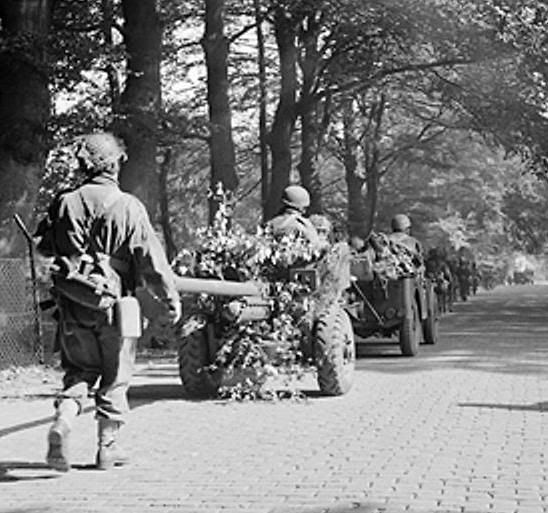
British soldier marching towards Lodz
The three battalions were to attack Lodz from three different directions, but trouble arose quite soon. Apparently the German tanks had broken the enemy line and chaos had taken over the confused defenders even in the sector attacked by the British troops. Alàs, the Soviet air force, in one of his few successful raids, had knocked down the recce unit that was to lead the brigade and destroyed most of its vehicles. Thus, the British infantry was blinded and without any knowledge of what awaited her.
The First Brigade found happy and histerical masses of Polish citizens who celebrated their arrival and their liberation. Just the fall of some artillery shell scattered them, but they returned even in greater numbers to gree the British soldiers, a fact that troubled the Allied advance and discovered their positions.
Cyrek Gryzbowski was lloking how a great number of Soviet soldiers gathered in a street of Lodz. A soldier, dressed in full uniform, helmet and rifle, looked at him: "We're off -he said- Tommy and Fritz are comming to town". Gryzbowski smiled and asked "Then you'll return now to Russia". The soldier thought for a short while and then replied. "No, Tovarich. We will fight[ii]".
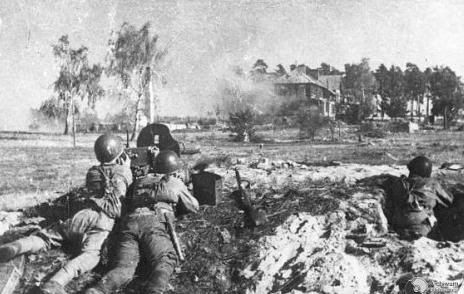
A Soviet machine gun fires againt the enemy troops
All of the sudden, the First Bataillon came under heavy fire from tanks and 37 mm guns. "Everything took place quite fast", remembered brigade Harry Callaghan. "We were advancing towards Lodz and, suddenly, I found myself in a ditch under enemy fire. Three of my mates lay dead on the road". Callaghan wasted no time. He saw movement in a tree, fifty meters in front of him. While the Polish citizens ran away in all directions, the brigade advanced with some of his men and fired a vicious fusillade against the tree. Once the fire subsided, a PPSh fell from the three and then a soldier
@Nathan Madien: Thank you!
Hi, all, ladies and gents.
For a while I'm going to drop writting this AAR. I feel not inclined to go on due to a combination of laziness, lack of motivation and some kind of writer's block. Once I feel ready, I'll be back.
I'm sorry if I disappoint you.
KS.
For a while I'm going to drop writting this AAR. I feel not inclined to go on due to a combination of laziness, lack of motivation and some kind of writer's block. Once I feel ready, I'll be back.
I'm sorry if I disappoint you.
KS.
For a while I'm going to drop writting this AAR. I feel not inclined to go on due to a combination of laziness, lack of motivation and some kind of writer's block. Once I feel ready, I'll be back.
Drop writting? :unsure:
Feel better, Kurt.
Chapter forty-eight: Dark skies
As it happened during the 1914-1918 conflict, the use of the airplane proved to be decisive for the land battles and since the very beginning of the war all the warring parties brought their air forces into the fight. Thus all available units, even the based in the most distant areas of the world, were brouhgt to the front line to help the battle with their firepower and soon the air was place of battles as disputed as those which took place in the ground.
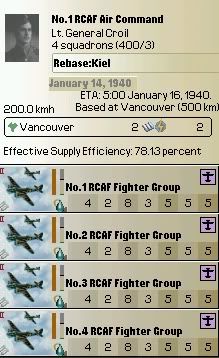
Canadain light bombers were rebased from their homeland to Europe
The surprise for the Allied forces were the discovery of a much bigger Polish air force than expected. The Kaiserliche Luftstreitkräfte attempted to destroy the enemy air force before it could take off and to do so attacked many of the enemy air forces. By the end of the first week of the war the German pilots claimed 300 air and ground victories over the enemy, a great over-estimated quantity of planes (according to modern sources, the Polish losses in that week were around 50 planes). Berlin and London did not know that Warsaw had withdrawn the bulk of their air force to the eastern parts of the country prior to launch them in coordinated attacks with the VVS against the Allied forces.
It was only by late January 1940 when the RAF and the Luftstreitkräfte began to fight in earnest againt the combined might of their enemy forces. Oddily, most of the air strenght of the Communist powers were used in the Polish front or in daring but doomed raids against Berlin. The modern P.37 Lós was used along the PZL.30 Żubr, an inferior design used for training only but rushed to the front-line service dure to the desperate situation of the Polish airforces, but both suffered heavy losses when intercepted by the Germans Bf 109s and the British Hurricanes as their escort fighter were too light to provide any meaningful protection and those raids just helped to decimate the once proud Polish force.
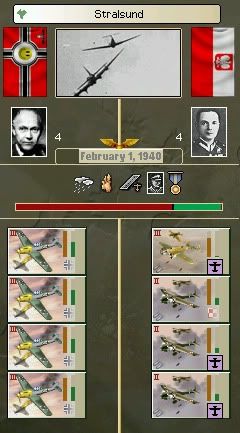
The failed raid against Stralsund, February 1st, 1940
By February 15th, 1940, the Polish air forces, which fielded 770 planes at the beginning of the war, had to withdraw their units to Soviet airbases in the Baltic and Ukraine to be reffited with new planes. By then their squadrons mustered slightly over 400 planes.
It was during those same days that the first units of the Free Polish Air Force were created in Britain: the 300th and 301st (Bomber) Squadrons and the 302nd and 303th Squadrons
Last edited:

The failed raid against Stralsund, February 1st, 1940
Which justifies Germany's smiley face flag.
Would've been ironic if the Germans had lost.
Last edited:

